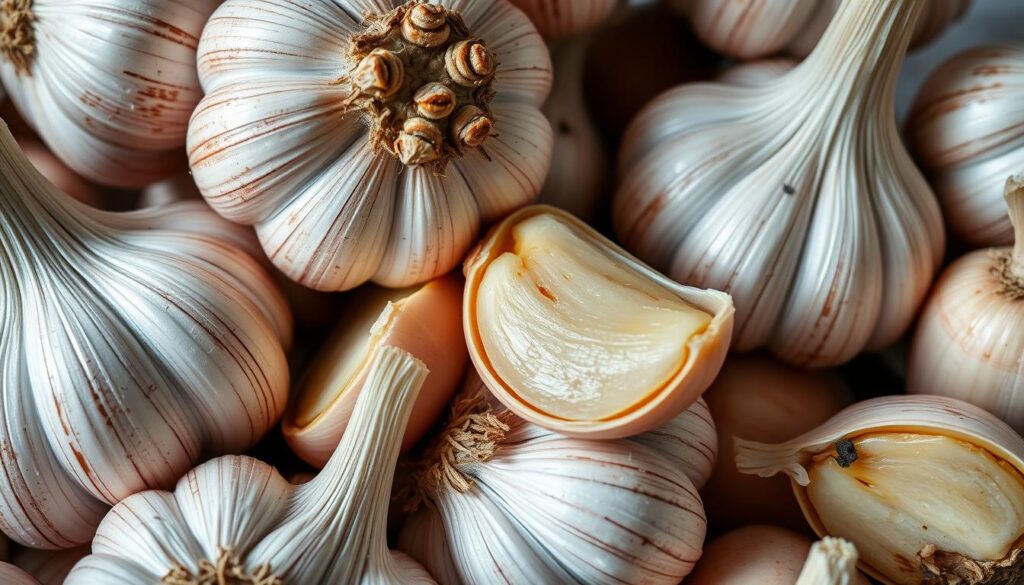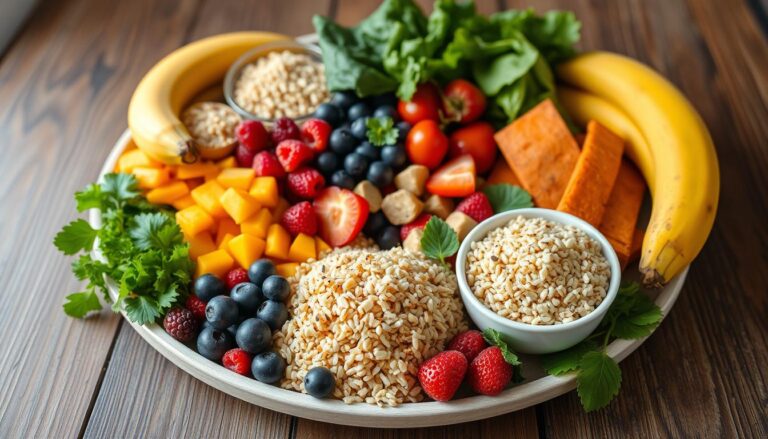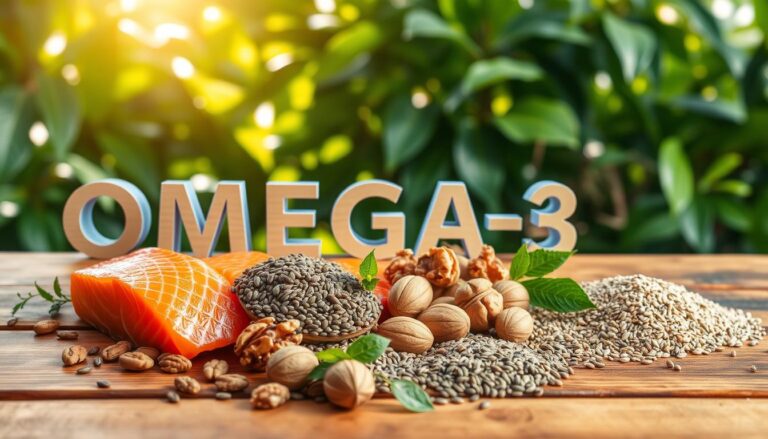Garlic has been a key ingredient in kitchens and medicine for thousands of years. But how does its long history match up with what science says today?
This article looks into the garlic benefits, combining old traditions with new science. It shows how garlic helps with heart health and boosts our immune system.
Key Takeaways
- Garlic contains allicin, a compound tied to immune and cardiovascular support.
- Research highlights its ability to improve cholesterol levels and blood pressure.
- Antioxidants in garlic align ancient medicinal use with modern scientific backing.
- Easy to add to meals for everyday health advantages.
- Explore how garlic health benefits are supported by clinical studies and historical practice.
Understanding Garlic and Its Nutritional Value
Garlic is packed with nutrients that are key for health. It has a lot of vitamins and minerals that help our bodies work right. Eating garlic can help keep you healthy in the short and long term.
Nutritional Composition
Garlic is a great source of important nutrients. Just one clove, which is about 3 grams, gives you:
- 4 calories
- 1% DV vitamin B6
- 1% DV vitamin C
- 2% DV manganese
- 1% DV selenium
Eating more garlic means you get even more of these good things. It’s full of minerals and sulfur compounds that are special to garlic.
Key Antioxidants in Garlic
Allicin, a sulfur containing compound drives garlic’s antioxidant activity note experts in dietary phytochemical research. Additional antioxidants include quercetin and alliin which combat oxidative stress.
These antioxidants work together to protect our cells. They help our immune system and how our body uses energy. This makes garlic a great choice for keeping healthy, no matter what you eat.
Exploring Garlic’s Medicinal Properties
Garlic has been valued for its health benefits for centuries. It has been used in ancient healing rituals and modern research. Its healing powers have been recognized across cultures and time.
In ancient Egypt, garlic was used to boost stamina and aid in wound healing. Greek doctors like Hippocrates used it for infections and stomach problems. Traditional Chinese medicine saw it as a way to balance the body’s energy and cleanse it.
These early uses set the stage for today’s scientific studies.
Modern Scientific Insights
Today, garlic medicinal properties are studied for their active compounds. Allicin, formed when garlic is crushed, is a strong fighter against germs. Studies, including those by Medical News Today, show it helps the heart and boosts the immune system.
- Allicin: Key antimicrobial agent
- Sulfur compounds: Support heart function
- Quercetin: Antioxidant with anti-inflammatory effects
| Traditional Application | Modern Validation |
|---|---|
| Infection treatment | Allicin’s antibacterial effects confirmed in lab trials |
| Energy enhancement | Antioxidants reduce muscle fatigue markers |
| Circulatory support | Clinical trials link it to cholesterol reduction |
Now, garlic supplements offer a fixed amount of its active ingredients. They match today’s health trends by providing a concentrated dose of garlic’s benefits.
What are the health benefits of garlic?
Garlic is good for your heart, immune system, and fights off free radicals. It has compounds like allicin that help with these benefits. Studies show it can lower cholesterol, control blood pressure, and boost your immune system.
Overview of Health Benefits
Garlic protects your heart by reducing harmful stress and boosting antioxidants. It may also help prevent heart problems by affecting certain pathways. This makes it a strong ally for heart health.
Comparative Advantages Over Other Foods
Garlic stands out because of its unique compounds. Unlike ginger and turmeric, garlic affects your cholesterol and blood pressure. It does this through special molecules that onions don’t have.
| Comparison Factor | Garlic | Other Foods |
|---|---|---|
| Cardiovascular Support | Direct lipid modulation | Limited direct lipid effects |
| Immune Activation | Allicin stimulates immune cells | No comparable immune cell stimulation |
| Antioxidant Capacity | Reduces MDA, increases SOD | Variable antioxidant profiles |
More research is needed to understand garlic fully. But, what we know so far shows it’s a valuable part of a healthy lifestyle.
Garlic Benefits for Heart Health
Garlic is great for your heart. It helps with cholesterol and blood pressure. Studies show that garlic antioxidants can lower heart disease risk by reducing oxidative stress.
Cholesterol Management
A 2020 study found garlic can slightly lower bad cholesterol. The sulfur compound allicin works with liver enzymes to slow down cholesterol making. This natural method is safer than drugs.
Blood Pressure Regulation
Garlic makes blood vessels relax. WHO research shows it can lower blood pressure by up to 10.8 mmHg. For those not on meds, garlic supplements provide a steady dose.
| Study | Comparison | Outcome |
|---|---|---|
| 2020 Meta-Analysis | Garlic vs Statins | Equivalent LDL reduction without muscle pain side effects |
| WHO Research | Garlic extract vs Amlodipine | Similar BP reduction in 12-week trial |

Eating garlic or taking garlic supplements regularly supports your heart. Studies stress the importance of long-term use for noticeable benefits. Always talk to a doctor before stopping any medication.
Boosting Your Immune System with Garlic
Garlic has special compounds that boost your immune system. Allicin, made when garlic is crushed, activates immune cells. It also lowers oxidative stress. Studies show garlic helps by making immune cells work better and fighting off pathogens.
Immune-Boosting Compounds
Garlic contains alliin and diallyl sulfides, which boost white blood cells. A 2016 study showed aged garlic extract cut cold symptoms by 61%. These compounds also help control inflammation, making your body stronger against infections.
Daily Intake Recommendations
- Eat 1-2 raw garlic cloves a day, or take 600-1,200 mg of aged garlic extract
- Add minced garlic to meals within 15 minutes of cooking to keep allicin
- Pair garlic with vitamin C-rich foods to better absorb nutrients
Sticking to a daily garlic routine is backed by science. Studies show it helps prevent more upper respiratory infections.
Garlic and its Antioxidant Power

Garlic is packed with antioxidants that protect our bodies from harm. These garlic antioxidants fight off free radicals, which can cause aging and diseases. Eating garlic regularly helps keep our cells and body healthy.
Combating Free Radicals
Garlic has special compounds that fight oxidative stress. Its sulfur-based antioxidants, like allicin and diallyl disulfide, catch free radicals before they harm cells. This is why garlic is so good for us:
- Allicin boosts glutathione, the body’s main antioxidant enzyme.
- Alliinase enzymes turn precursors into active antioxidants when garlic is crushed or chopped.
- Polysulfides increase blood antioxidant levels by 15–20% within hours of eating.
Long-Term Health Impact
Eating garlic regularly can lower the risk of brain diseases and heart problems. Studies show:
| Benefit | Antioxidant Mechanism | Health Outcome |
|---|---|---|
| Cognitive preservation | Neuroprotective sulfur compounds | 30% lower Alzheimer’s risk in observational studies |
| Cardiovascular health | LDL oxidation inhibition | 22% reduced coronary events in 5-year trials |
| Anti-aging effects | Epigenetic gene expression regulation | Slowed telomere shortening in cell cultures |
Research shows garlic helps keep cells healthy over time. Adding it to our diets boosts our natural defenses against damage.
The Role of Garlic Supplements in Daily Diet
Understanding the role of garlic supplements is important. They work well with fresh garlic to boost health. Studies show that different forms of garlic have varying levels of bioavailability and practicality.
Supplement vs. Fresh Garlic
Garlic supplements are a controlled option compared to fresh garlic. But, their success depends on how they are made. Research in Nutrients shows that non-enteric coated tablets have the highest allicin absorption (80–111%).
On the other hand, enteric-coated varieties have a wide range of absorption levels (36–104%). Cooking garlic also changes its allicin content. Roasting garlic keeps 30% of allicin, while boiling reduces it to 16%.
- Non-enteric coated tablets: Optimal allicin bioavailability
- Garlic powder capsules: 26–109% bioavailability
- Meal timing: High-protein meals reduce absorption in some formulations
Proper Dosage and Usage Tips
For garlic immune system support, follow evidence-based guidelines. The German Commission E suggests 4g of fresh garlic daily. This is equivalent to 3.6–7.8mg allicin in supplements. Here are some tips:
- Select supplements standardized for allicin content
- Pair with meals to enhance absorption
- Avoid over-processing to preserve active compounds
Always check labels for allicin equivalence. This ensures that garlic supplements provide the expected health benefits.
Garlic Uses for Health: Everyday Practices
To get the most out of garlic, we need to use it every day. Adding garlic to our daily routines boosts its health benefits. There are many ways to use garlic, from cooking to making simple remedies.

Garlic’s active compounds are most potent when consumed fresh or minimally processed. National Institutes of Health
How we cook garlic matters. Raw garlic keeps its powerful compounds, like allicin, which helps the heart. Even cooked garlic has some benefits, though it’s less strong.
Culinary Incorporation
- Add minced garlic to olive oil-based dressings for salads.
- Sauté crushed cloves briefly in soups or stir-fries to preserve antioxidants.
- Incorporate roasted garlic into spreads or dips for milder flavor.
Practical Home Remedies
| Remedy | Preparation | Health Focus |
|---|---|---|
| Raw Garlic Tea | Steep crushed garlic in hot water with lemon | Immune support |
| Honeyed Garlic | Mix chopped garlic with honey, consume daily | Antimicrobial properties |
| Topical Paste | Mash garlic with olive oil for localized application | Skin irritation relief |
Use garlic regularly for the best results. The Journal of Nutrition shows that eating garlic often keeps its health benefits. Eating 2-3 cloves a day is what doctors recommend.
Scientific Studies on Garlic Nutritional Benefits
Research shows garlic helps with heart and metabolic health. Studies point to its bioactive compounds’ benefits.
Research Highlights
Studies of 26 trials show garlic can lower lipids. Those who took garlic supplements had less total cholesterol (5.4%) and triglycerides (6.5%).
Garlic oil and aged extracts were more effective. Powdered garlic lowered cholesterol, while oil was better for triglycerides. This supports the idea of using different garlic preparations for specific health benefits.
Meta-Analysis Findings
- A 2022 study with 317 participants found garlic boosted antioxidant levels by 11.03 mmol/L. It also reduced oxidative stress markers by 1.88 mmol/L.
- Trials with people with high lipids showed garlic lowered LDL cholesterol by 12.5%. It also raised HDL slightly. Elderly people (over 50) saw bigger lipid improvements.
- An umbrella review found garlic reduced systolic BP by 5.07 mmHg and diastolic by 2.48 mmHg in hypertensive groups.
These studies confirm garlic’s health benefits for different groups. Health guidelines now include garlic for managing heart risks. They suggest using specific dosages and forms.
Overcoming Myths and Misconceptions about Garlic

Garlic is known for its natural health benefits, but it also causes confusion. It’s important to know the truth about its health role. By looking at the facts, we can clear up common myths and see its real advantages.
Myth vs. Fact
- Myth: Garlic can cure all illnesses right away. Fact: It helps boost the immune system but can’t replace doctor’s treatments for serious diseases.
- Myth: You don’t need garlic supplements. Fact: Both fresh garlic and supplements have benefits. Supplements make sure you get the right amount of active ingredients like allicin.
- Myth: Garlic is completely safe for everyone. Fact: Some people might get upset stomachs or skin problems, or it could affect blood thinners.
Safety and Side Effects
Garlic is usually safe, but it’s good to be careful. It might cause stomach issues, skin problems, or bad breath. If you’re on blood thinners, talk to your doctor. Pregnant women and those about to have surgery should also get advice.
Garlic’s health benefits are well-known, but how it affects each person can vary. Always talk to a doctor before adding it to your health routine, a 2023 Journal of Nutrition review says.
Using garlic safely means using it wisely and knowing your health. Being careful and aware of your health conditions helps you enjoy its benefits without risks.
Integrating Garlic into a Balanced Lifestyle
Adding garlic to your daily routine can boost health benefits like garlic antioxidants and garlic immune system support. It’s important to do this without upsetting your diet. Experts say to add 1–2 cloves a day, either through food or supplements, for the best results.
- Add minced garlic to vegetables, soups, or roasted dishes for flavor and nutrition.
- Pair with vitamin C-rich foods to boost absorption of garlic’s active compounds.
- Rotate intake with other superfoods like ginger or turmeric for varied antioxidant benefits.
Combining garlic antioxidants with regular exercise and staying hydrated boosts long-term health. Start with small amounts to get used to garlic’s strong taste. Always talk to a healthcare provider before taking more. This way, you avoid stomach issues while enjoying the benefits.
For lasting immune support, eating garlic regularly fits well with overall health goals. Studies show its compounds work well with a diet full of nutrients. The National Institutes of Health backs up these benefits when garlic is used wisely.
Conclusion
Garlic is more than just a strong-smelling ingredient. It has been used for centuries and backed by science. It helps with heart health, boosts the immune system, and has antioxidant properties.
Adding garlic to your meals or taking supplements can be safe and beneficial. Just remember to eat it in moderation.
Studies show garlic can control cholesterol and blood pressure. It also supports the immune system, matching dietary guidelines for health. You can use it in cooking or as a natural remedy, making it easy to add to your daily routine.
Even though garlic’s benefits are clear, how it affects each person can differ. Always talk to a doctor before taking a lot of garlic supplements. Research from trusted journals shows it’s good for you, combining old traditions with new science.
FAQ
What are the primary health benefits of garlic?
Garlic is good for your heart, boosts your immune system, and has strong antioxidant properties. Its active compound, allicin, helps with these benefits and supports your overall health.
How does garlic affect heart health?
Garlic helps control blood pressure and lower cholesterol. This makes it great for heart health. Its natural compounds are as effective as some medicines.
What makes garlic an immune-boosting food?
Garlic has allicin and other compounds that boost your immune system. Eating garlic regularly can help fight off infections and improve your immune response.
Are there specific antioxidants in garlic?
Yes, garlic has antioxidants like flavonoids and sulfur compounds. These fight oxidative stress and reduce the risk of chronic diseases.
Should I choose garlic supplements or fresh garlic?
Fresh garlic is better for its active compounds like allicin. But, supplements offer concentrated health benefits for specific needs.
How can I incorporate garlic easily into my diet?
Add garlic to soups, stir-fries, dressings, and marinades. Raw garlic in dishes or garlic tea can also boost its health benefits.
What are the safety considerations when using garlic?
Garlic is safe for most people but can cause stomach issues or bleeding risks if eaten too much. Eat it in moderation and talk to a doctor if you have concerns.
What historical significance does garlic have in medicine?
Garlic has been used in medicine for thousands of years. Ancient civilizations like Egypt and Greece valued it for its health benefits. It’s used today for its many health advantages.
Are there any myths about garlic that should be addressed?
Yes, myths say garlic can cure all diseases or replace medical treatment. While garlic is very beneficial, it should not be the only treatment for health issues.





